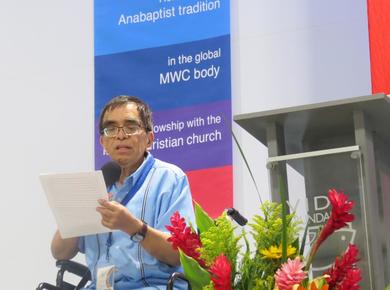Posted: December 23, 2019
Mass migration is a concern for many countries today: it is part of both the history and the present of Anabaptist-Mennonites. We have been both those who are migrating and those who are welcoming neighbours to a new home. At Justice on the Journey: Migration and the Anabaptist Mennonite Story in San Rafael de Heredia, Costa Rica, 6 April 2019, presenters from around the world gave testimonies of migration.
A caravan of thousands of Central American migrants arrived in Mexico at the end of 2018. For many years now, the country has been a through-route of people migrating from Central America in the hope of reaching the United States (USA). However, this is the first time that organized groups have demanded that the Mexican border be opened and that they be granted safe passage.
While some sectors thought and acted hostilely toward the caravans of migrants arriving in Mexico at the end of 2018 and the beginning of 2019, the overall feeling was one of solidarity made real through humanitarian campaigns to provide migrants with clothes, food, medicines, medical attention and accompaniment en route to the North.
Paths of righteousness
In Conferencia de Iglesias Evangélicas Anabautistas Menonitas de México (CIEAMM – the Evangelical Anabaptist and Mennonite Conference of Mexico), calls were made through Sendas de Justicia (paths of righteousness ministry) to coordinate with organizations and churches that wanted to respond to the needs expressed by the migrants.
This is an important point: it is necessary to listen to those one wants to serve so that acts of solidarity are relevant and focused on the shortages that migrants face, and not on the good will of those who want to help, but are lacking nothing. Once the kind of help needed by the temporary refugees in Mexico was identified, this information and the addresses of the collection points was shared so that packages could be sent there.
Fernando Sandoval, the CIEAMM Sendas de Justicia coordinator, invited and urged the community to collect funds so that the things migrants needed could be bought. In order to discover these needs, he visited the shelter that the Mexico City government opened to house the thousands of displaced Central American migrants that had come mainly from Honduras and El Salvador.
Fernando Sandoval talked with men and women of varying ages. He requested their permission to record their stories on his cell phone so that he could share these with the churches. What our community heard and saw was very moving. Each story told was one of tragic suffering that allowed us to understand why people decide to abandon their homes and try to cross into the USA. In addition to poverty, other reasons for migrating include violence and fear of becoming a victim of all kinds of abuse that violate human dignity.
A beautiful partnership
The Fraternity provided support that Sendas de Justicia took to the migrants. It was surprising to see the response of the community that decided to open their arms and hearts to vulnerable people passing through Mexico.
We took Jesus’ teaching in Matthew 25:35–36 seriously, inviting us to express love in solidarity by feeding the hungry, clothing the naked, giving water to the thirsty, welcoming the stranger, taking care of the sick and visiting the prisoners. We practiced compassion by putting ourselves in the place of migrants in need and acted to provide accompaniment and consolation.
A beautiful partnership arose between Sendas de Justicia and a group of professors and students from the Anabaptist Mennonite Biblical Seminary in Elkhart, Indiana, USA, as we worked to assist the migrants. Through this they realized what the CIEAMM and Iglesia Fraternidad Cristiana/Vida Nueva (New Life Church) were doing to serve migrants. They shared this information and collected an offering that was sent to Sendas de Justicia to use as they saw fit. Sendas de Justicia bought implements that were given to the migrants and then they reported to the donors on how the money was used. We firmly believe that in Christian stewardship it is essential to use well the resources that are entrusted by brothers and sisters in faith, and report on that.
There is a history of solidarity with migrants in Iglesia Fraternidad Cristiana/Vida Nueva. For many years, the community has made donations in-kind (food, personal hygiene items) to the Tochán House. This is a refuge for migrants where they can seek legal defense while they are in Mexico and hope to enter the United States. The brothers and sisters take different products to Tochán House. This is how we show our understanding that we are followers of another migrant who was born under similar circumstances to the families that begin their exodus due to the hard hearts of those in power. This migrant is Jesus.
To open our arms and hearts to migrants is to be a Christian disciple. Among the people that travel, there are people like the Syrophoenician woman who help us to uncover dimensions of faith that are only visible when we are fragile and marginalized. Jesus said of this woman that she had great faith and he held her up as an example of trust in God (Matt 15:28). And we have found this same faith in the migrants.
—Carlos Martínez García, pastor and journalist in Mexico, is the moderator of the Evangelical Anabaptist and Mennonite Conference of Mexico (CIEAMM). He was one of the speakers at Renew 2027, held in San Rafael de Heredia, Costa Rica. His presentation on 6 April 2019 was titled, “In Search of Justice: Migration in Anabaptist-Mennonite History”. This article is an adaptation of that presentation.
This article first appeared in Courier/Correo/Courrier October 2019.

Comments: